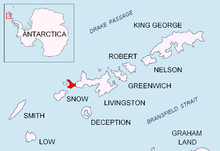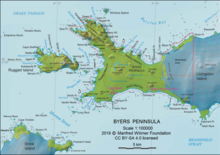
Svishtov Cove is a 2.19 km wide cove indenting for 1.48 km the northwest extremity of Ray Promontory on Byers Peninsula, Livingston Island in the South Shetland Islands, Antarctica. it is entered southwest of Essex Point and northeast of Start Point.

Start Point is a point marking the northwest end of Byers Peninsula, Livingston Island in the South Shetland Islands, Antarctica and forming the southwest side of the entrance to Svishtov Cove and the northeast side of the entrance to the New Plymouth bay. Discovered by Edward Bransfield in January 1820, and so named by him because of its resemblance to a point on the south coast of England by the same name and because it was the place where his operations began.

Ugain Point is the point on the west coast of Rugged Island in the South Shetland Islands, Antarctica separating Smyadovo Cove to the north and Bogomil Cove to the south. Situated 1.76 km north-northwest of Benson Point, 970 m north of Kokalyane Point and 1.55 km south of Cape Sheffield.

Bakshev Ridge is a rugged rocky ridge on Rugged Island, off the west coast of Byers Peninsula of Livingston Island in the South Shetland Islands, Antarctica. The ridge extends 700 m in a southeast-northwest direction. The highest point of elevation is 239 m, situated 660 m east of San Stefano Peak, 1.25 km west of Vund Point, and 1.1 km northwest of Radev Point.

San Stefano Peak is a rocky peak rising to 256 m, the summit of Rugged Island off the west coast of Byers Peninsula of Livingston Island in the South Shetland Islands, Antarctica. Situated in the central part of the island, 3.48 km northeast of Benson Point, 4.17 km southeast of Cape Sheffield, 830 m south of Cherven Peak, 1.91 km west of Vund Point, and 1.58 km northwest of Radev Point.

Vund Point is the point forming the east extremity of Rugged Island off the west coast of Byers Peninsula of Livingston Island in the South Shetland Islands, Antarctica. The area was visited by early 19th century sealers.

Sevar Point is a point on the south coast of Byers Peninsula on Livingston Island in the South Shetland Islands, Antarctica situated 1.9 km east-southeast of Devils Point, 2.71 km west of Nikopol Point, and 2.97 km northeast of Long Rock in Morton Strait. It is surmounted by Wasp Hill on the north-northeast, Sealer Hill on the east-northeast, and forms the east side of the entrance to Raskuporis Cove.

Dometa Point is a point in the middle part of South Beaches on Byers Peninsula, Livingston Island in the South Shetland Islands, Antarctica. It is situated 4.3 km west-northwest of Rish Point, 1.2 km southwest of Negro Hill, 4.6 km southeast of Chester Cone, and 4.2 km east-northeast of Nikopol Point. Fontus Lake is centred 600 m northeast of the point.

Dospey Heights are the ice-free heights on Ray Promontory in the northwestern part of Byers Peninsula on Livingston Island in the South Shetland Islands, Antarctica. Extending 6 km southeastwards from Essex Point and Start Point, and 2.6 km wide. Rising to 265 m at Start Hill.

Voyteh Point is the point forming the east side of the entrance to Richards Cove on the north coast of Ray Promontory in the northwestern part of Byers Peninsula on Livingston Island in the South Shetland Islands, Antarctica. It is surmounted by Sàbat Hill. The area was visited by early 19th century sealers.

Vardim Rocks are a group of rocks situated on the south side of Hell Gates, facing Devils Point in the southwest extremity of Byers Peninsula on Livingston Island in the South Shetland Islands, Antarctica. Extending 1.3 km (0.81 mi) in east-west direction. The two principal islets in the group, Demon and Sprite, are extending 420 by 400 m and 270 by 150 m respectively, with surface area of the former 9 hectares. The area was visited by early 19th century sealers.

Ray Promontory is the 7 km long and 2.8 km wide promontory lying between Barclay Bay and the New Plymouth sound, and forming the northwest part of Byers Peninsula, Livingston Island in the South Shetland Islands, Antarctica ending up in Start Point and Essex Point. The promontory's interior is mostly occupied by Dospey Heights.

Window Island is a small ice-free island off the north coast of Ray Promontory in the northwest of Byers Peninsula, Livingston Island in the South Shetland Islands, Antarctica. The island has a surface area of 23 hectares and rises to 72 m (236 ft). It was known to the early 19th century sealers operating on Byers Peninsula.

Lair Point is a point projecting 570 m into Barclay Bay from Robbery Beaches on Byers Peninsula, Livingston Island in the South Shetland Islands, Antarctica and forming the east side of the entrance to Kukuzel Cove. Dominated by Lair Hill.

Laager Point is a conspicuous headland extending out from President Beaches on Byers Peninsula, Livingston Island in the South Shetland Islands, Antarctica facing Astor Island. It forms the southeast entrance point for New Plymouth harbour and the northeast entrance point for Osogovo Bay. Naiad Lake is situated on the southwest side of the point and Pistiros Lake is centred 900 m east of it. The area was visited by 19th century sealers.

Sealer Hill is a hill rising to 70 m in the southwest part of Byers Peninsula, Livingston Island in the South Shetland Islands, Antarctica. It surmounts Nikopol Point and Sevar Point to the east-southeast and west-southwest, respectively. The area was inhabited by 19th century sealers.

Wasp Hill is a hill rising to 72 meters in the southwest part of Byers Peninsula, Livingston Island in the South Shetland Islands, Antarctica. Surmounting Sevar Point to the south-southwest. The area was visited by 19th century sealers.

Camp Livingston is an Argentine seasonal base camp on Byers Peninsula, Livingston Island in the South Shetland Islands, Antarctica. The area was visited by early 19th century sealers.

Enrique Hill is the ice-free hill rising to 156 m in Dospey Heights on the Ray Promontory of Byers Peninsula, Livingston Island in the South Shetland Islands, Antarctica. It surmounts Barclay Bay to the east and northeast, and Diomedes Lake on the southeast

Limnopolar Lake is one of the numerous freshwater lakes on the ice-free Byers Peninsula, Livingston Island in the South Shetland Islands, Antarctica. The feature is oval in shape, extending 175 m in southeast-northwest direction and 140 m in southwest-northeast direction. It drains through a 2.7 km stream westwards into Osogovo Bay north of Point Smellie.





